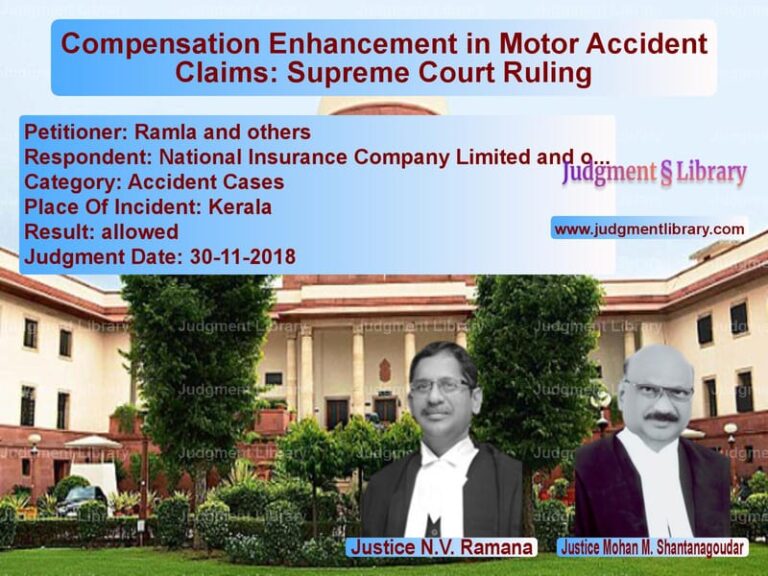Validity of Will Revocation: Supreme Court Restores Trial Court Decision
The case revolves around the dispute over the validity of a Will executed by Rajendra Singh in favor of Sarjug Singh. The Supreme Court was called upon to determine whether the Will had been validly revoked by a subsequent cancellation deed. The High Court had earlier ruled in favor of Sarjug Singh, granting probate, but the Supreme Court reversed this decision, restoring the judgment of the First Additional District Judge, Chapra.
Background of the Case
Rajendra Singh, who was issueless, executed a Will on September 14, 1960, in favor of Sarjug Singh. However, the objectors claimed that the testator revoked this Will through a registered cancellation deed dated February 2, 1963. The Trial Court had found the cancellation deed to be genuine and ruled that the Will was revoked, thereby denying probate to Sarjug Singh. The High Court later reversed this decision, questioning the authenticity of the cancellation deed.
Arguments Presented by the Parties
The objectors argued that Rajendra Singh had validly executed a cancellation deed and that it was duly registered. They relied on evidence from an expert witness, attesting witnesses, and the scribe of the deed to prove its authenticity.
The probate applicant, on the other hand, contended that Rajendra Singh was in poor health at the time and incapable of personally executing the cancellation deed at the Sub-Registrar’s office. They also raised concerns about the authenticity of the thumb impression on the cancellation deed.
Trial Court’s Findings
The Trial Court found that the cancellation deed was validly executed. It relied on the testimony of handwriting expert Hassan Raza (OW-3), attesting witness Jagarnath Prasad (OW-4), and scribe Shashinath Mishra (OW-5). The expert report (Ext. B) confirmed that the thumb impression on the cancellation deed matched that of Rajendra Singh. The court also observed that all documents executed by Rajendra Singh bore his thumb impression rather than his signature, making the use of a thumb impression on the cancellation deed consistent with his usual practice.
The Trial Court also rejected the claim that Rajendra Singh was physically incapable of executing the deed, as there was no medical evidence supporting the claim that he was paralyzed.
High Court’s Reversal
The High Court, however, took a different view. It focused on the health condition of Rajendra Singh and inferred that he was too ill to have personally executed the cancellation deed at the Sub-Registrar’s office. The court also raised concerns about possible impersonation, despite no such claim being made before the Trial Court. Consequently, the High Court ruled that the Will had not been revoked and granted probate to Sarjug Singh.
Supreme Court’s Ruling
The Supreme Court found serious errors in the High Court’s judgment. It emphasized that the High Court had ignored material evidence proving the genuineness of the cancellation deed. The expert’s report confirming the thumb impression, along with testimony from key witnesses, was marked without objection in the Trial Court, making it inadmissible to question its validity at the appellate stage.
The Supreme Court noted, “The High Court, in our assessment, failed to give due weightage to the evidence of OW-3, OW-4, and OW-5 who led evidence on genuineness of the cancellation deed. Instead, erroneous presumption was drawn on impersonation and incapability of the testator to visit the office of the Sub-Registrar to register the Cancellation Deed.”
The Court also reiterated the legal principle that objections to the mode of proof must be raised at the trial stage and not at the appellate level. Citing precedents, the Court held that since the probate applicant did not object to the evidence in the Trial Court, they could not challenge it later.
Conclusion
Based on this analysis, the Supreme Court allowed the appeal, set aside the High Court’s judgment, and restored the Trial Court’s decision. It concluded that the Will was validly revoked by the cancellation deed and Sarjug Singh was not entitled to probate.
“For the above reasoning, we allow the present appeal, set aside the impugned order of the High Court, and restore the judgment of the First Additional District Judge, Chapra, with no order as to costs.”
Petitioner Name: Lachhmi Narain Singh (D) Through LRs & Ors..Respondent Name: Sarjug Singh (Dead) Through LRs & Ors..Judgment By: Justice Sanjay Kishan Kaul, Justice Hrishikesh Roy.Place Of Incident: Patna, Bihar.Judgment Date: 17-08-2021.
Don’t miss out on the full details! Download the complete judgment in PDF format below and gain valuable insights instantly!
Download Judgment: lachhmi-narain-singh-vs-sarjug-singh-(dead)-supreme-court-of-india-judgment-dated-17-08-2021.pdf
Directly Download Judgment: Directly download this Judgment
See all petitions in Succession and Wills
See all petitions in Property Disputes
See all petitions in Judgment by Sanjay Kishan Kaul
See all petitions in Judgment by Hrishikesh Roy
See all petitions in allowed
See all petitions in supreme court of India judgments August 2021
See all petitions in 2021 judgments
See all posts in Civil Cases Category
See all allowed petitions in Civil Cases Category
See all Dismissed petitions in Civil Cases Category
See all partially allowed petitions in Civil Cases Category







